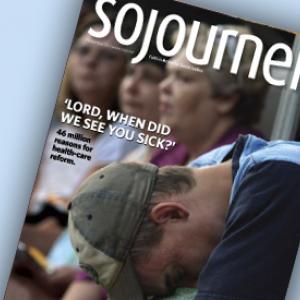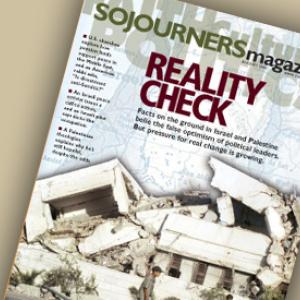Rabbi Arthur Waskow founded (1983) and directs The Shalom Center. He had long before been a founding Fellow (1962-1977) of the Institute for Policy Studies, where he wrote The Limits of Defense, From Race Riot to Sit-in, and the original Freedom Seder, and co-authored with Marc Raskin “A Call to Resist Illegitimate Authority,” an influential outcry for resistance to the U.S. war against Vietnam. Feeling called to and by the Freedom Seder into a lifelong engagement with prophetic spirituality, he wrote Godwrestling – Round 2, Seasons of Our Joy, Torah of the Earth, The Tent of Abraham, and Dancing in God's Earthquake: The Coming Transformation of Religion, along with 20 other books.
Posts By This Author
46 Million Reasons for Health-Care Reform
The moral imperatives for change.
We Need an Abrahamic Alliance of the 'Passionate Best'
Israel, Gaza, and the Goldstone Report: A Call for Self-Examination During the High Holy Days
I'm Awake at 3 a.m. because My Ribs are Hurting
From Frozen Rebellion to Flowering Seed
As the band of runaway Israelite slaves wander in their search for freedom, again and again they grow rebellious. In the greatest of these rebellions, Korach criticizes Moses, claiming "The whole community is holy -- all of them! Why do you, Moses and Aaron, raise yourselves above them?" (Numbers 16: 1-3ff)
What if the Bible's Ruth Came to America Today?
God's Image and Caesar's Image: Torture and the Currency of Empire
One of the central teachings of Torah is that all human beings are made in the Image of God. That teaching and what flows from it are at the heart of Jewish prohibitions on the use of torture -- and perhaps at the heart of Christian opposition to torture as well.
Indeed, the Rabbis
Swine Flu, Hog Farms, and Piggish Politics
Beyond Gaza: An Abrahamic Peace
God's Inaugural Spokespersons
Pro-Israel, Pro-Peace, Anti-Occupation
Is there anti-Semitism in the anti-war movement?
The Sukkah and the World Trade Center
A few weeks ago, the Jewish community celebrated the harvest festival by building "sukkot." What is a "sukkah"?
Radical Shabbat: Free Time, Free People
Honorable work and restful renewal are both aspects of responsibility.
Our religious traditions teach that human beings need time for self-reflective spiritual growth, for loving family, and for communal sharing. And the earth itself needs time to rest. Yet today's high-stress, environmentally toxic economy and culture preclude this sort of spiritual deepening.
Indeed, most Americans today work longer, harder, and more according to someone else's schedule than they did 30 years ago. We have less time to raise children, share neighborhood concerns, or develop our spiritual life. This unremitting addiction to "doing" and "making" has intensified many forms of pollution of the earth. This life situation crosses what we usually see as class lines: Single mothers who are working at minimum wages for fast-food chains and holding on by their fingernails to a second job to make ends meet feel desperately overworked; and so do wealthy brain surgeons.
Why is this happening? Because doing, making, profiting, producing, and consuming have been elevated to idols. While corporate profits have zoomed and the concentration of wealth has increased, real wages have remained stagnant for 20 years, and the pressure has intensified to work harder and longer just to stay in the same place.
Biblical "shabbat" is a critique of these idolatries.
Shabbat—the Sabbath—appears first as a cosmic truth in the creation story (Genesis 2:1-4), but seems to have had no effect on human life till just after the great liberation of the Israelites from slavery. In Exodus (16:4-30) Shabbat is made known, along with the manna in the wilderness. This story of food and rest echoes and reverses the tale of Eden.
Brothers Reconciled

Sage Ross / Shutterstock.com
From almost the beginning to the very end of the Book of Genesis, one theme whirls through many variations: war and peace between brothers (and one pair of sisters).
Twice-Promised Land
Can the children of Isaac and Ishmael live together in peace?



